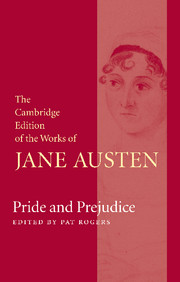Book contents
- Frontmatter
- Contents
- General Editor’s Preface
- Acknowledgements
- Chronology
- Introduction
- Note on the Text
- Pride and Prejudice
- Pride and Prejudice: Volume I
- Pride and Prejudice: Volume II
- Pride and Prejudice: Volume III
- Corrections and Emendations to 1813 text
- Appendix 1 Thomas Egerton and the Publication History
- Appendix 2 Legal and Military Background
- Appendix 3 Pemberley and its Models
- Appendix 4 Note on the second and third editions of Pride and Prejudice
- Abbreviations
- Explanatory Notes
Chapter 10
Published online by Cambridge University Press: 19 December 2020
- Frontmatter
- Contents
- General Editor’s Preface
- Acknowledgements
- Chronology
- Introduction
- Note on the Text
- Pride and Prejudice
- Pride and Prejudice: Volume I
- Pride and Prejudice: Volume II
- Pride and Prejudice: Volume III
- Corrections and Emendations to 1813 text
- Appendix 1 Thomas Egerton and the Publication History
- Appendix 2 Legal and Military Background
- Appendix 3 Pemberley and its Models
- Appendix 4 Note on the second and third editions of Pride and Prejudice
- Abbreviations
- Explanatory Notes
Summary
THE day passed much as the day before had done. Mrs. Hurst and Miss Bingley had spent some hours of the morning with the invalid, who continued, though slowly, to mend; and in the evening Elizabeth joined their party in the drawing-room. The loo table, however, did not appear. Mr. Darcy was writing, and Miss Bingley, seated near him, was watching the progress of his letter, and repeatedly calling off his attention by messages to his sister. Mr. Hurst and Mr. Bingley were at piquet, and Mrs. Hurst was observing their game.
Elizabeth took up some needlework, and was sufficiently amused in attending to what passed between Darcy and his companion. The perpetual commendations of the lady either on his hand-writing, or on the evenness of his lines, or on the length of his letter, with the perfect unconcern with which her praises were received, formed a curious dialogue, and was exactly in unison with her opinion of each.
“Howdelighted Miss Darcy will be to receive such a letter!”
He made no answer.
“You write uncommonly fast.”
“You are mistaken. I write rather slowly.”
“How many letters you must have occasion to write in the course of the year! Letters of business too! How odious I should think them!”
“It is fortunate, then, that they fall to my lot instead of to yours.”
“Pray tell your sister that I long to see her.”
“I have already told her so once, by your desire.”
“I am afraid you do not like your pen. Let me mend it for you. I mend pens remarkably well.”
“Thank you—but I always mend my own.”
“How can you contrive to write so even?”
He was silent.
“Tell your sister I amdelighted to hear of her improvement on the harp, and pray let her know that I amquite in raptures with her beautiful little design for a table, and I think it infinitely superior to Miss Grantley’s.”
“Will you give me leave to defer your raptures till I write again?—At present I have not room to do them justice.”
“Oh! it is of no consequence. I shall see her in January. But do you always write such charming long letters5 to her, Mr. Darcy?”
- Type
- Chapter
- Information
- Pride and Prejudice , pp. 51 - 58Publisher: Cambridge University PressPrint publication year: 2006

